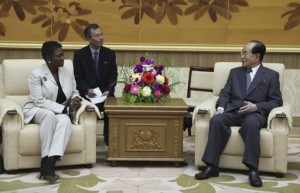
UNITED NATIONS — There’s rarely good news from North Korea. The quaintly-titled Democratic People’s Republic of Korea (DPRK) is facing a worsening humanitarian crisis, while at the same time the government is heightening political repression, and the communist rulers are vaingloriously pursuing their nuclear weapons program.
Valerie Amos, the UN’s Humanitarian chief just returned from a fact-finding mission to North Korea; her findings were nearly as grim as the gray landscape, where approximately 6 million people, or a quarter of the population, relied on international food aid. She spoke of the country’s “chronic poverty and underdevelopment,” while at the same time adding that the long term dangers of malnutrition affects 33 percent of children under five years old.

Significantly Ms. Amos’ delegation included Kim Won-Soo, close personal confident and Chef de Cabinet to UN Secretary General Ban Ki-Moon, himself a South Korean.
Food shortages would have “long-term implications for generations to come, even if drastic action is taken today.” Ms. Amos added, “Traveling around the country, one cannot help but notice that people, children and adults alike, are generally short and thin.”
For example, government food rations were cut from 400 grams per person in March to 200 grams in July, and have remained at this dangerously low level since. People are surviving on maize, rice and cabbage.
International donor appeals have received a tepid response, largely because contributors are rightly concerned over the lack of transparency in the food aid distribution process in this hermetically-closed country. The European Commission, Sweden, Switzerland and Australia are key donors. Notably missing are global good guy aid givers; Canada, Japan and the United States. Allegations persist that food aid goes to the military and regime stalwarts.
Amos added that she called on government officials in Pyongyang to “lead the humanitarian effort, not be an onlooker.” She implored the Government to share data and information. She stated, “I made clear that the quality of international support will rest on the credibility of the information that we are able to provide, particularly on humanitarian needs and how donor money is being used.”
Admittedly in soliciting humanitarian aid for this serial human rights offender, Valerie Amos walks a thin line; she stated judiciously that the UN’s efforts must be based on “independence, neutrality and impartiality.”
In fact, the $218 million appeal for 2011 has seen only $74 million in delivered funds or about 34 percent of the total.
Though North Korea faces a shortage of arable land and perpetually bad weather, there’s also little doubt that the antiquated and state-structured socialist farm system is part of the problem. One has only to contrast the two sides of this divided nation to see the bountiful food production in South Korea.
Addressing the food aid distribution, days earlier Marzuki Darusman, the UN’s Special Rapporteur in Human Rights in the DPRK warned that UN agencies working in North Korea, “have faced numerous operational challenges, especially in accessing various parts of the country in order to monitor and ensure aid reaches its intended recipient.” He spoke of the government authorities “often either unwilling or unable to provide access required for humanitarian agencies.”
While barred from access into North Korea, Darusman later enumerated the worsening human rights situation in the country.
“In the Democratic People’s Republic of Korea, freedom of speech and expression is extremely limited,” and criticism of the government is strictly curtailed, and is punishable by arrest and incarceration in prison camps.
Darusman, a former Indonesian Attorney General, warned that North Korea maintains a wide network of political prison camps, some of which date back to the 1950’s. These political prisons hold an estimated 200,000 people! He characterized the DPRK as a state where “practically a whole range of civil, political, economic, social and cultural rights are denied on a regular basis.”
The contradictions abound. There’s a growing humanitarian crisis while the neo-Stalinist regime surrealistically pursues a costly nuclear weapons program which, while politically destabilizing, equally draws a huge amount of otherwise scarce resources.
Will Kim Jong-Il’s regime someday be forced to choose between nutrition or neutrons?
John J. Metzler is a U.N. correspondent covering diplomatic and defense issues. He writes weekly for WorldTribune.com.
